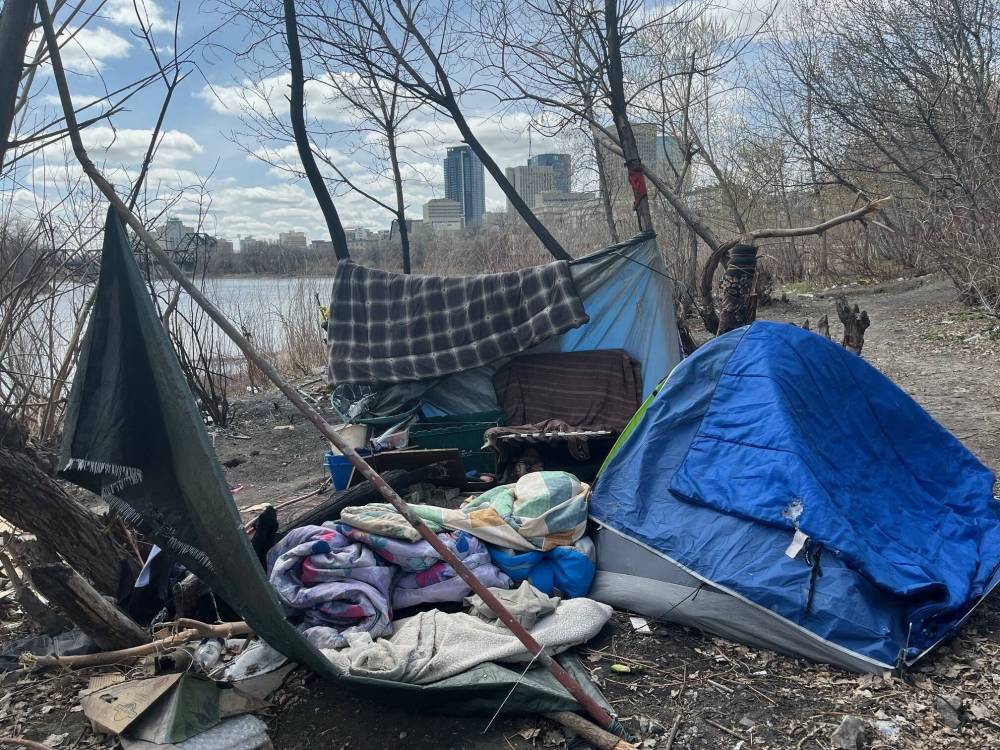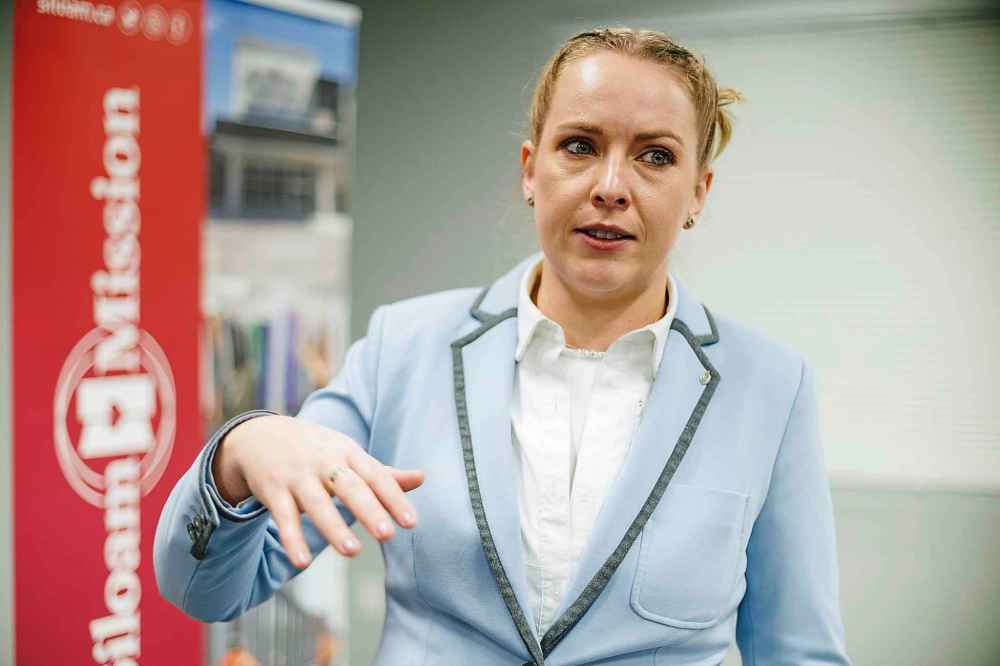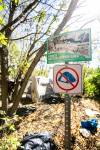Street census counts record-high number of homeless people in city
Advertisement
Read this article for free:
or
Already have an account? Log in here »
To continue reading, please subscribe:
Monthly Digital Subscription
$0 for the first 4 weeks*
- Enjoy unlimited reading on winnipegfreepress.com
- Read the E-Edition, our digital replica newspaper
- Access News Break, our award-winning app
- Play interactive puzzles
*No charge for 4 weeks then price increases to the regular rate of $19.00 plus GST every four weeks. Offer available to new and qualified returning subscribers only. Cancel any time.
Monthly Digital Subscription
$4.75/week*
- Enjoy unlimited reading on winnipegfreepress.com
- Read the E-Edition, our digital replica newspaper
- Access News Break, our award-winning app
- Play interactive puzzles
*Billed as $19 plus GST every four weeks. Cancel any time.
To continue reading, please subscribe:
Add Free Press access to your Brandon Sun subscription for only an additional
$1 for the first 4 weeks*
*Your next subscription payment will increase by $1.00 and you will be charged $16.99 plus GST for four weeks. After four weeks, your payment will increase to $23.99 plus GST every four weeks.
Read unlimited articles for free today:
or
Already have an account? Log in here »
Winnipeg’s record-high homelessness count comes as no shock to those living it.
“The system doesn’t have a way of helping us,” said Jeff, who has spent the last six years on the streets, now living in an encampment close to Main Street Project.
Beside him sat Jamie, another encampment resident, fiddling with a pipe and trying to get his butane lighter to spark, as opioid-overdose rescue naloxone kits lay nearby.

“Only certain people are getting chosen to get housing,” Jamie said, referring to the provincial government’s Your Way Home strategy to end chronic homelessness.
“I’d take it if they had it, especially with winter coming. Can’t afford clothes, can’t afford shoes. The system wants to keep us where we are.”
The most recent street census, conducted by End Homelessness Winnipeg late last year, shows the problem in the city has hit a record high.
Several hundred outreach workers took to the streets over one week last November to hold surveys at encampments, track the number of homeless people over a 24-hour period and collect data from other organizations.
End Homelessness Winnipeg said in a report set to be released in full Thursday that it tallied 2,469 homeless people during one day of the census period — higher than any count since it began doing the count in 2015.
“Housing instability is not random… it’s rooted in systemic inequality.”– End Homelessness Winnipeg’s preliminary report
That is a 97 per cent increase compared with the previous census, when 1,256 homeless people were counted over a 24-hour period in 2022.
“Housing instability is not random — it’s rooted in systemic inequality,” the organization said in a preliminary report provided to media Tuesday.
The co-ordinator of the province’s Your Way Home strategy, which has set a target of 2031 to end chronic homelessness, said she knew the data was coming.
“We knew the number would be much larger; this gives us a benchmark for success,” said Tessa Blaikie Whitecloud, Premier Wab Kinew’s senior adviser on homelessness.
The census was conducted before the strategy launched in January, and the data highlights the impact of the previous Progressive Conservative government’s affordable housing selloff, she said.

“We knew the number was going to increase over time,” she said. “In the same way that the impacts of losing social housing means that these numbers have grown, it also takes time for solutions to show their impact.”
In short, the plan is less than a year old — and progress will take time.
But Blaikie Whitecloud believes the 2031 goal is still within reach. As housing stock grows and prevention work ramps up, the numbers will eventually balance, she said.
“There is momentum building,” Blaikie Whitecloud said.
For some, however, finding a stable place to live feels like an impossible task, according to those who’ve tried — some multiple times. And it’s made worse when those experiencing it see a living space with no one in it.
“I walk around the block and there are a bunch of places,” said one encampment resident who asked not to be named.
“We knew the number would be much larger; this gives us a benchmark for success.”– Tessa Blaikie Whitecloud, Premier Wab Kinew’s senior adviser on homelessness.
Currently, close to 70 people have moved from encampments into largely social housing through the strategy, a government source said. About 700 people are living in encampments in Manitoba.
Few living on the street believe the strategy will be successful.
“There’s no hope,” said Jamie.
Blaikie Whitecloud said many have been failed by housing in the past, and while housing must come first, support has to follow close behind.
“As soon as there is an actual unit to offer somebody, that is clean, that is dignified, that has the right support services, people move and want to be housed,” she said. “But people don’t currently believe that those units are going to be available to them. We have to build them as fast as we can, but with dignity and durability.”
In Canada, for every one person who ceases to be homeless, another 1.5 people find themselves on the street, Blaikie Whitecloud noted.
The average age of the people EHW surveyed was 41, many of them experienced homelessness at the age of 18. More than one in four were older than 50. More than half had been homeless for more than six months of the past year.
“People don’t currently believe that those units are going to be available to them. We have to build them as fast as we can, but with dignity and durability.”– Tessa Blaikie Whitecloud, who believes while housing must come first, support has to follow close behind.
Indigenous people made up the vast majority of the people surveyed, with 63 per cent identifying as First Nations and another 15 per cent as Métis. Nearly half of all respondents had been involved in the child-welfare system as a youth.
The number of homeless newcomers has increased significantly. Two per cent of people surveyed in 2022 were immigrants and fewer than one per cent were refugees. In 2024 the number was 13 per cent, nearly half of them refugees.
Some at the encampment at the corner of Main Street and Higgins Avenue said immigration is one of the reasons why they’re stuck where they are.
“There are no jobs for us — they’ve all been taken up by immigrants,” said Wayne, who said he got sick and lost his job and has been homeless for the past three months.
“I can’t get medical treatment. The place I was working didn’t have insurance. I can’t get back to work. I have no other support. My family has passed on. My kids… I don’t want to bother them.”
The majority of people surveyed indicated they have difficulties with substance use. Mobility issues, mental-health struggles and chronic medical conditions were also common.
In the encampment surrounding Circle of Life Thunderbird House, drug pipes — some scorched black at the ends — were scattered in the dirt alongside broken lighters with their casings cracked open, a scatter of butane canisters and burnt foil nearby. The ground is littered with the remnants of use — cheap plastic, ash and glass.
The census has been held five times since the project, funded by the federal government, was launched. There were 1,400 homeless people counted in 2015, 1,519 in 2018, 1,127 in 2021 and 1,256 in 2022.
The 2024 census was expanded to include more surveys and reached farther out from the city centre.
When the census was launched Nov. 5, Housing, Addictions and Homelessness Minister Bernadette Smith said its results would “help guide our work here in the province and here as a government.”
malak.abas@freepress.mb.ca
scott.billeck@freepress.mb.ca

Several wise folks — ok, ok, journalism types — once told Scott he better make sure he can report on news before he learns to write about sports. In what can only be described as a minor miracle, he listened.

Malak Abas is a city reporter at the Free Press. Born and raised in Winnipeg's North End, she led the campus paper at the University of Manitoba before joining the Free Press in 2020.
Our newsroom depends on a growing audience of readers to power our journalism. If you are not a paid reader, please consider becoming a subscriber.
Our newsroom depends on its audience of readers to power our journalism. Thank you for your support.
History
Updated on Tuesday, August 26, 2025 12:28 PM CDT: Corrects number of surveys done
Updated on Tuesday, August 26, 2025 5:37 PM CDT: Includes additional details and quotes.
Updated on Tuesday, August 26, 2025 7:07 PM CDT: Correction made factual error.
Updated on Tuesday, August 26, 2025 7:29 PM CDT: Attribution added to a fact in story.
Updated on Wednesday, August 27, 2025 11:33 AM CDT: Clarifies Tessa Blaikie Whitecloud is the co-ordinator of the province’s Your Way Home strategy.






















